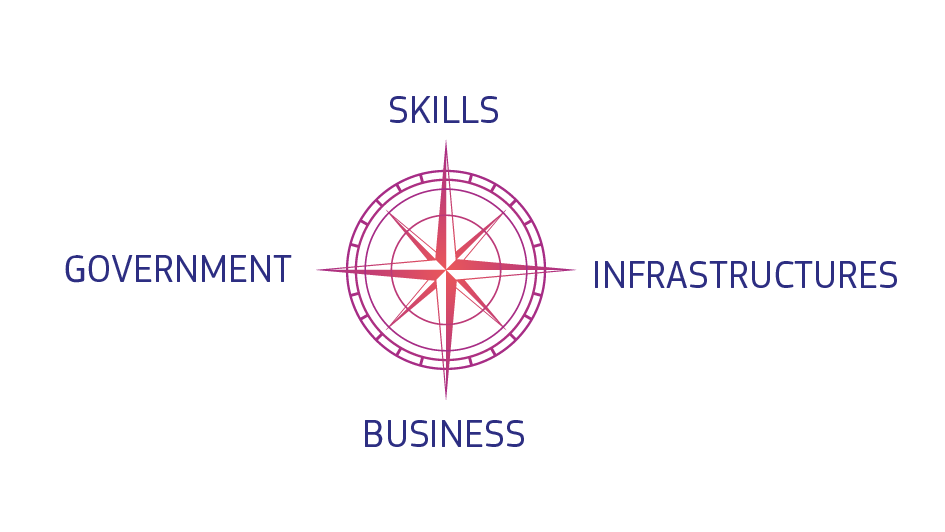European Commission – 2030 Digital Compass: the European way for the Digital Decade
This 'digital compass' for Europe comprises four areas (skills, infrastructure, businesses and government) for which the EU's digital ambitions for 2030 are set out in concrete terms. The progress of these goals will be continuously monitored at the national and European levels and, based on this monitor, a 'European State of the Digital Decade' report will be published annually. That report may, for instance, lead to further cooperation between the European institutions and the Member States or may give rise to recommendations by the European Commission. To get the necessary financial clout together, the Commission is looking into the possibility of allowing a combination of EU budget, national budgets and private investment to realise "Multi-Country Projects", apart from traditional funding methods. Furthermore, the Commission also plans to declare a set of digital principles to be taken into account when implementing this digital compass.
What: policy orienting document
Impact level: 3 - Document with a clear policy orientation
For who: policy makers, digital service providers and users, sector organisations
Summary

Regarding ICT skills, the Commission sets a target of ensuring that 80% of the adult population has basic digital skills by 2030. In addition, the Commission also aims to ensure that there are 20 million ICT specialists working within the EU by 2030, with gender convergence between men and women.
Regarding ICT infrastructure, the Commission sets the following targets: (i) all European households will be covered by a gigabit network, with all populated areas covered by a 5G network; (ii) Europe's share in the production of advanced and sustainable semiconductors (including processors) should reach at least 20% of the global production value (i. e. a doubling compared to today); (iii) The installation of 10.000 climate-neutral highly secure 'edge nodes' whereby they will be distributed in such a way as to ensure fast access to data services regardless of location; (iv) By 2025, the first quantum computer should be in operation, making the EU a leader in quantum technology by 2030.
Regarding the digital transformation of companies, the following targets were proclaimed: (i) 75% of EU companies use cloud services, artificial intelligence and big data; (ii) more than 90% of SMEs achieve a basic level of digital intensity; (iii) More focus on innovative scale-ups and facilitate access to finance so that the number of EU Unicorns doubles by 2030.
Regarding the digitisation of public services, there are the following targets: (i) 100% online provision of essential public services; (ii) All European citizens should have access to their digital medical records; (iii) 80% of all citizens use a digital identity (card).
There is also a fifth section 'digital citizenship' where reference is made to (existing) digital rights and (yet to be formulated) digital principles. Rights include freedom of expression and protection of intellectual property online. The eight proposed digital principles for users, policymakers and digital service providers are:
- Universal access to the internet
- A safe and secure online environment
- Digital education and digital skills for all so that they can actively participate in society and democratic processes
- Access to digital systems and devices that are environmentally friendly
- Accessible and people-centred digital public services and administration
- Ethical principles for human-centred algorithms
- Protecting and empowering children in the online space
- Access to digital health services
The Commission will continuously monitor the progress of these goals at the national and European levels and, based on this monitoring, will publish an annual 'European State of the Digital Decade' report. That report could, for instance, lead to further cooperation between the European institutions and member states or trigger recommendations by the European Commission. In order to gather the necessary financial clout, the Commission is exploring the possibility of enabling a combination of EU budget, national budgets and private investment, apart from traditional funding methods, to realise "Multi-Country Projects". Such projects aim to fill identified gaps in the EU's digital facilities and support an interconnected, interoperable and secure digital single market.
Finally, this communication also includes a section on the international cooperation through digital partnerships. Such partnerships aim to encourage other countries to align or converge with EU norms and standards. Aspects covered here include taxation of the digital economy but also cooperation with developing countries. The Commission also explicitly casts itself here as a global defender of the open, decentralised internet (based on a single global web), of a use of technology that safeguards individual freedoms and of a level playing field in the digital world. Translated with www.DeepL.com/Translator (free version)